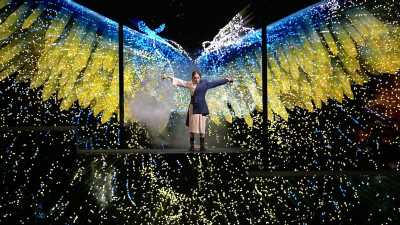Zelensky v Eurovision: a political song and dance over the future of Europe
Save articles for later
Add articles to your saved list and come back to them any time.
This weekend’s Eurovision Song Contest final will be co-hosted by Ukrainian singer Julia Sanina, feature video postcards filmed at the Independence Monument in Kyiv and the botanical garden at Lviv University and a performance from the Ukrainian group Kalush Orchestra.
But it will not feature an address to the estimated television audience of 160 million people worldwide from Ukrainian president Volodymyr Zelensky. The Ukrainian leader asked to make one, but Eurovision’s organising body, the European Broadcasting Union (EBU) knocked him back.
Volodymyr Zelensky gives a video address.Credit: AP
The move drew immediate criticism from British Prime Minister Rishi Sunak.
“The values and freedoms that President Zelensky and the people of Ukraine are fighting for are not political, they’re fundamental,” Sunak’s spokesman said.
“The prime minister thinks it would be fitting for President Zelensky to address the event, given that we’re hosting it on behalf of Ukraine,” the spokesman added.
Britain’s Prime Minister Rishi Sunak believes the Ukrainian president should be able to address the Eurovision audience.Credit: Getty
Former British prime minister Boris Johnson also weighed in on social media, saying: “It would have been right to hear from President Zelensky at Eurovision. There is only one reason the contest is not in Ukraine and that is because of Putin’s illegal war.” (The UK, which was the 2022 runner-up, is hosting the event because the competition winner, Ukraine, could not.)
Which is not to imply that Eurovision is anti-Ukraine. The opposite is true. The competition, now in its 67th year, expelled Russia last year because of its invasion of Ukraine.
A year earlier, the pro-Russian Belarus was expelled because the country’s national broadcaster had submitted a song with political lyrics and, when asked to replace it, failed to do so.
The EBU, which requires participating artists refrain from making political statements, either from the stage, or in their song lyrics, is holding fast to its policy, despite the chorus of disapproval from British politicians.
“The Eurovision Song Contest is an international entertainment show and governed by strict rules and principles which have been established since its creation,” a statement from the EBU said.
Zelensky’s request “to address the audience at the Eurovision Song Contest, whilst made with laudable intentions, regrettably cannot be granted by the EBU as it would be against the rules of the event,” the EBU continued.
Kalush Orchestra from Ukraine celebrating after winning Eurovision 2022 in May.Credit: AP
“One of the cornerstones of the contest is the non-political nature of the event. This principle prohibits the possibility of making political or similar statements as part of the contest.”
Since Russia’s invasion of Ukraine, Zelensky has used high profile media events to take his country’s message to the world. He has spoken at the Cannes and Venice Film Festivals, he virtually rang the opening bell of the New York Stock Exchange last year and spoke at the Grammys and this year’s Golden Globes. “There will be no third World War, it is not a trilogy,” he told the Globes audience.
But Zelensky’s request to speak at the Oscars, the highest profile of Hollywood’s star-powered stages, has been declined twice. The Toronto Film Festival also declined to lend him their stage, with a spokesperson saying the festival “does not comment on discussions with dignitaries, government officials or international embassies” but “stands in solidarity with Ukrainians”.
But despite the EBU’s insistence on an apolitical stance, the competition, born in the aftermath of the continent-scarring Second World War, has often walked a geopolitically precarious line. Its rules are enforced, but often inconsistently.
In 2005, Lebanon was invited to join the competition and got as far as nominating an artist, Aline Lahoud, and a song, Quand Tout S’enfuit. But the state-owned broadcaster, Télé Liban, announced it intention to cut the performance by the Israeli artist from its broadcast, a violation of EBU rules, and Lebanon was subsequently disqualified.
In 2016, Ukraine’s song, 1944, which contained references to Joseph Stalin’s deportation of Crimean Tatars – “When strangers are coming / they come to your house / they kill you all and say / we’re not guilty, not guilty” – was seen as a political commentary on the Russian annexation of Crimea. The song was allowed.
And in 2019, when the competition was staged in Tel Aviv, Israel, Icelandic techno/punk rock band Hatari, who had publicly taken a pro-Palestine stance, were cautioned by organisers. They made no statements but held up a Palestinian flag during the broadcast and Iceland’s broadcaster RUV was fined €5000.
Compared to the politically charged environment in which the 2022 competition was held – the dramatic expulsion of Russia, a historically strong competitor – the 2023 competition had seemed uncharacteristically calm until Zelensky’s request and the EBU’s refusal.
Whatever the outcome of Zelensky’s plea, Eurovision’s apolitical stance is becoming ever more difficult to navigate in an increasingly fractious Europe.
Get a note directly from our foreign correspondents on what’s making headlines around the world. Sign up for the weekly What in the World newsletter here.
Most Viewed in World
From our partners
Source: Read Full Article




